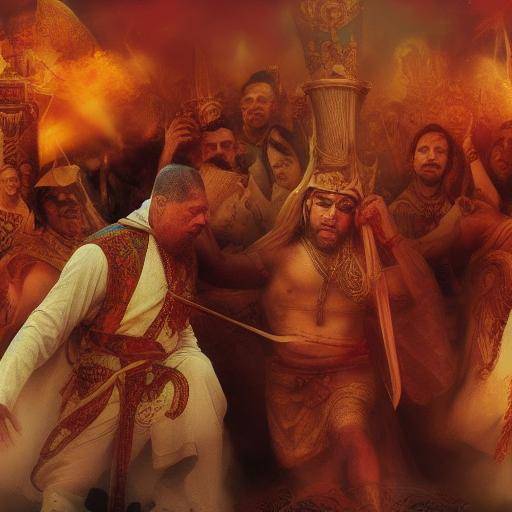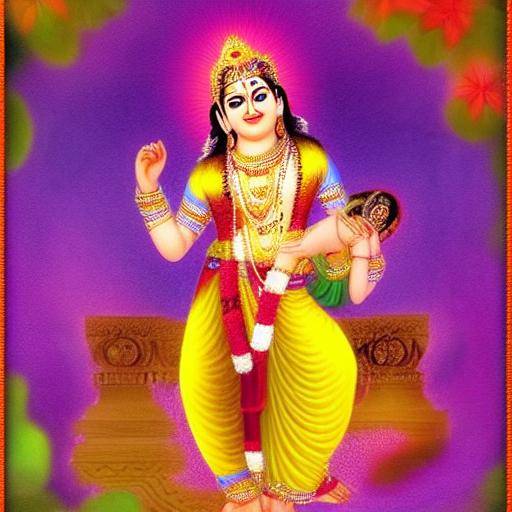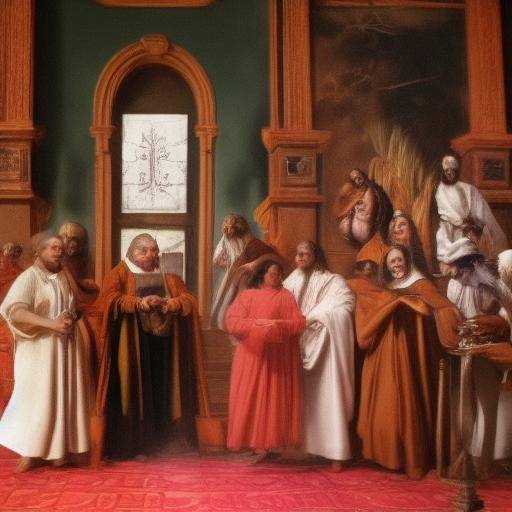
Hinduism is one of the oldest and most complex religions in the world, with a rich mythological tradition spanning thousands of years. Two fundamental concepts in this tradition are karma and dharma, which play a crucial role in Hindu cosmovision. In this article, we will explore in depth the meaning, historical evolution, practical application and cultural impact of these concepts, as well as their relationship with Hindu mythology. Throughout the journey, we will unravel the complexities of these ideas, analyze their practical applications, and compare their relevance in the context of Hindu myths.
Introduction
The concept of karma is central to Hindu philosophy, and its influence extends far beyond the limits of this religion. Karma refers to the cosmic law of cause and effect, according to which our actions have consequences, either in this life or in future lives. The dharma, on the other hand, is the moral duty and the universal law that governs the existence and proper behavior for each individual in his or her life station. These concepts are intertwined in Hindu mythology, shaping the stories of gods and heroes, and providing a moral framework for understanding the universe.
History and Background
The concept of karma has its roots in the old Vedas texts, dating back more than 3000 years ago. Initially, karma was understood as a ritual act or sacrifice that generated an effect on the material or spiritual world. Over time, this concept expanded to include human actions and their influence in the reincarnation cycle, known as samsara. The dharma, for its part, originates in the Hindu religious and legal texts known as the Dharmashastras, which delineate the moral and ethical duties of each person according to their social position and stage of life.
Analysis in Deep
Karma and dharma influence not only personal life, but also society and the universe in its entirety. The understanding and application of these concepts have evolved over the centuries, adapting to different cultural and social contexts. Today, karma and dharma remain fundamental to the understanding of morality and ethics in Hindu society, as well as in spiritual practice and the pursuit of liberation, or moksha.
Comprehensive review
Karma and dharma are manifested in Hindu mythology through stories of deities such as Vishnu, Shiva, and Brahma, whose actions exemplify the principles of karma and dharma. These stories offer powerful moral and ethical lessons, and serve as examples of how to live a life in harmony with the universe. In addition, throughout epic texts such as Mahabharata and Ramayana, concrete examples of how the characters face the consequences of their actions and fulfill their moral duties in difficult situations are presented.
Comparative analysis
Karma and Dharma in Mythological Context
Karma and dharma are fundamental in Hindu mythology. While karma represents the law of cause and effect, dharma establishes the duties and responsibilities of each being in the universe. In mythology, we see how the gods and heroes, facing ethical and moral challenges, seek to fulfill their dharma and accept the karmic consequences of their actions.
Practical Tips and Accessible Tips
Applying Karma and Dharma in Daily Life
- Reflect on your daily actions and their possible consequences.
- Seek to act according to your moral and ethical duties, instead of pursuing only personal benefit.
- Practice compassion and empathy towards others, recognizing the interconnection of all life.
Industry Perspectives and Expert Reviews
The modern understanding of karma and dharma has led to a greater appreciation of the interconnection between all forms of life and a renewed approach to personal and social responsibility. Experts in religion, philosophy and ethics point to the continuing relevance of these concepts in the search for meaning and purpose in the contemporary world.
Case Studies and Real Life Applications
Examples of Karma and Dharma in Action
- The ethical leadership in the business world that prioritizes the well-being of all stakeholders.
- Charitable and philanthropic actions that reflect a commitment to dharma to help the needy.
- Situations of forgiveness and reconciliation that demonstrate the understanding of karma and the quest for harmony.
Future Trends and Predictions
Globalization and the growing interconnection between cultures are leading these fundamental concepts of Hindu mythology to a wider audience. Interest in karma and dharma is expected to continue to grow as people seek significant ways of understanding their place in the world and addressing current ethical and moral challenges.
Conclusions
The concepts of karma and dharma have played a transformative role in Hindu mythology and remain fundamental to understanding morality, ethics and spirituality in contemporary society. By exploring its historical origins, practical applications and representation in Hindu mythology, we can acquire a deeper appreciation of the interconnection of all forms of life and the search for universal harmony.
Frequently asked questions
How does karma influence daily life according to Hindu mythology?
Karma influences daily life by reminding us that our actions have consequences, both in the short and long term. According to Hindu mythology, our actions can influence our future lives and the reincarnation cycle, so it is essential to act consciously and ethically.
What is the relationship between dharma and karma in Hindu mythology?
In Hindu mythology, dharma and karma are intrinsically related. Dharma establishes the moral and ethical duties of each individual, while karma represents the law of cause and effect, that is, the consequences of our actions in the universe.
How to apply the concept of dharma in modern life?
In modern life, applying dharma implies acting in accordance with moral duties and responsibilities, both towards oneself and others. This may include acting with compassion, honesty, and justice in all interactions and decisions.
Are there specific practices to balance karma according to Hindu mythology?
Hindu mythology does not prescribe specific practices to balance karma, as it is considered a natural result of actions. However, ethical conduct, compassion and selfless service are promoted as ways to accumulate good karma.
What is the relevance of karma and dharma in contemporary society?
In contemporary society, karma and dharma remain relevant as moral and ethical guides that encourage responsible behaviour, social justice and compassion. These concepts offer a valuable perspective on the interconnection of all forms of life and the quest for universal harmony.
How do karma and dharma influence modern understanding of ethics and morality?
Karma and dharma influence modern understanding of ethics and morality by promoting a vision of life based on responsibility, compassion and justice. These concepts offer a framework in which to consider the consequences of our actions and our obligations towards others.
Hindu mythology offers a rich perspective on the role of karma and dharma in human life, and how these fundamental concepts have influenced the history, culture and morality of society. By understanding the depth and interconnection of these concepts, we can better appreciate the timeless wisdom they offer in the search for harmony and purpose in life.
With this, we have explored in depth the role of karma and dharma in Hindu mythology, addressing its meaning, historical evolution, practical applications and its relation to mythological stories. These concepts are not only fundamental in Hindu philosophy, but also offer a valuable perspective on ethics, morality and universal interconnection that resonates in contemporary society.
Remember that the understanding of karma and dharma goes beyond words; its true meaning is found in conscious reflection and ethical application in our daily lives. With this ancestral wisdom, we can aspire to live in harmony with the universe and contribute to a more compassionate and just world for all forms of life.
Sources:




